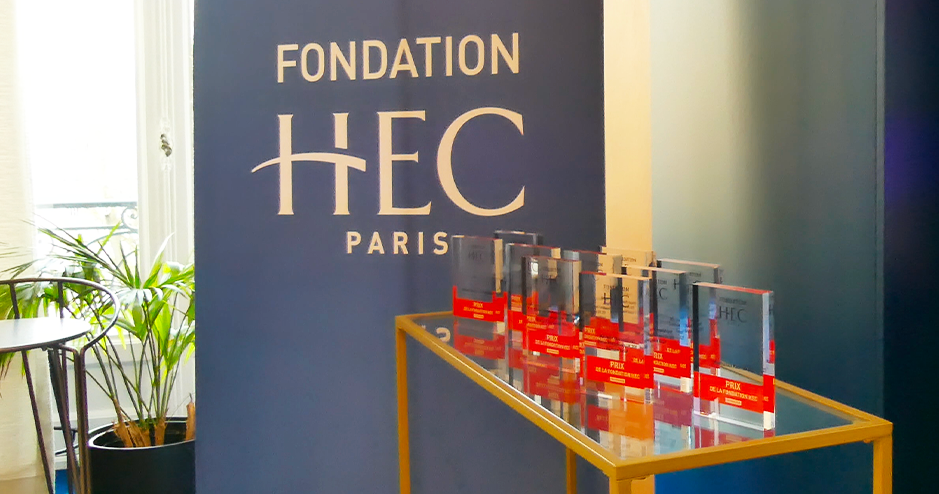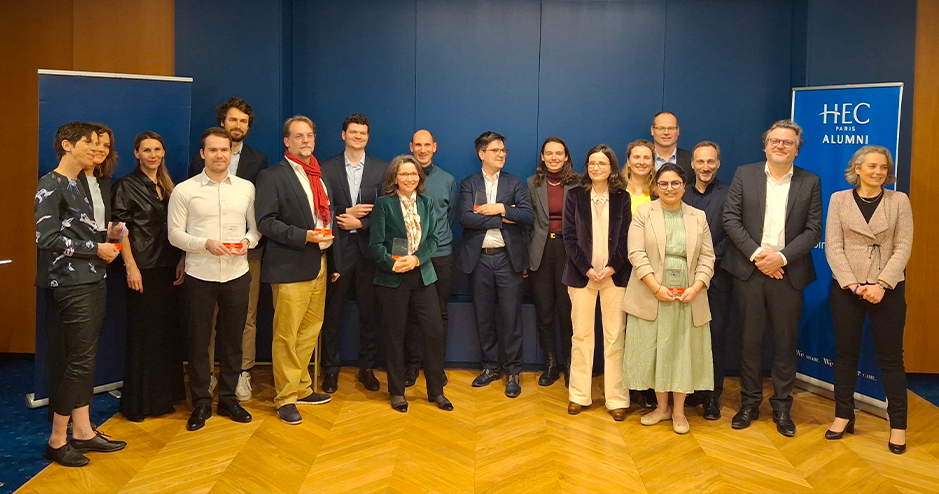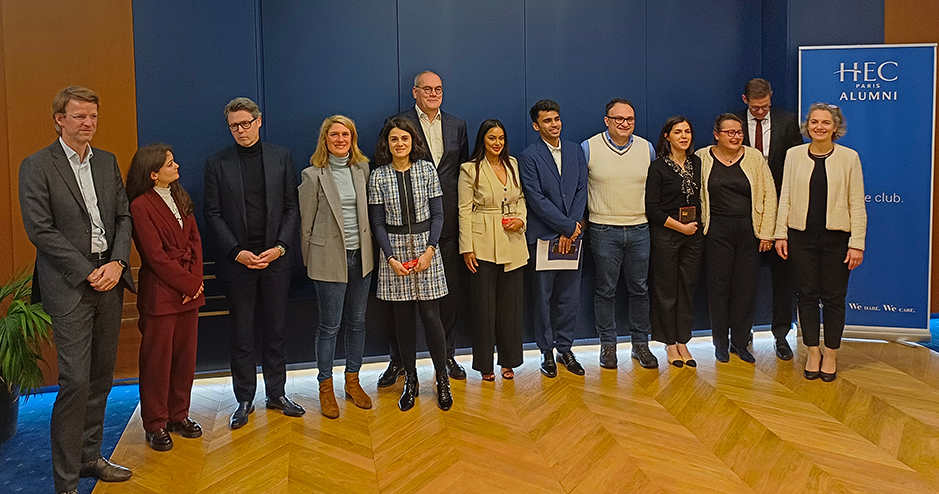Break or Build? Prizewinning Scholars Address the Tipping Points of Tech, Health, and Equity
Paris, March 2025. A dozen HEC scholars were rewarded for offering perspectives on some of society’s most pressing economic, technological, and social challenges. The 2025 Foundation Awards (for research in 2024) highlight a growing focus on how businesses and governments attempt to navigate breakneck technological change led by the AI revolution.

At the two rewards ceremony in Paris, the prizewinning students and academics shared their studies on topics which engage with urgent systemic challenges be they societal, technological, environmental, or organizational. Their research also suggested bold, sometimes cautionary, paths forward.
These ranged from the societal risks and promises of AI in energy to period poverty and educational inequality. But there were also strong insights into innovation under secrecy and constraints; healthcare accessibility in underserved areas; strategic business transformation under crisis; ethical leadership in teaching; and nuanced research on AI and jobs
While these research topics covered were indeed varied, one trend stood out: an increasing emphasis on the societal implications of emerging technologies. AI is no longer a niche subject in computer science. It has established itself as central to debates in finance, creativity, corporate strategy, and education. Sustainability, another recurring theme, has prompted these researchers to explore how behavioral economics and market incentives can drive environmental change.
Another of the most examined areas is the impact of AI on economic structures. HEC research has shown that technological change does not simply replace jobs - it changes how companies structure their workforce. The 2024 study by economist Antonin Bergeaud, which bagged the Best Researcher Award, highlights how AI adoption often leads to more outsourcing. When firms integrate digital tools, they tend to externalize certain tasks, relying more on service providers rather than in-house employees. “This shift has long-term consequences for wages and job stability,” Bergeaud noted during the March award-winning ceremony. His work also examines why European productivity growth has lagged behind the U.S. since the 1980s and suggests that European innovation policies should focus more on fostering industry-academic collaboration rather than relying primarily on tax incentives.
Regulating the Regulators
The increasing power of digital platforms has led to new questions about governance and accountability. PhD student, Madhulika Kaul - who won the Doctoral Thesis Award for her research on how large tech platforms act as private regulators - examined how companies like Amazon and Google operate not just as businesses but as regulatory bodies in their own right. Jury Chair Claire Calmejane found Kaul’s research crucial as “regulations are a key part of defining democracy.” For Kaul, looking at what is behind platforms is key: “These platforms decide what products get visibility controlling marketplaces and content moderation,” she explained. “They also decide what data is shared, and even how financial transactions occur. They create private regulatory systems that often have more influence than government policies.” Kaul’s findings thus raise questions about accountability and suggest that regulators may need to rethink regulatory approaches to ensure that private firms do not have unchecked control over digital economies.
Meanwhile, research is revealing how certain financial incentives can reduce culinary habits and benefit environmental preservation. In his final year of his doctoral studies, PhD candidate Yurii Handziuk joined forces with HEC professor Stefano Lovo to see if small financial incentives could reduce the students’ meat consumption at the school's canteen. The results? Offering small discounts on vegetarian meals significantly influences consumer choices. “Behavioral interventions can be surprisingly effective,” said Lovo. “Instead of imposing top-down regulations, policymakers and companies might consider financial nudges as a way to encourage sustainable choices.” The findings, which were rewarded the HEC the Faculty Impact prize, suggest that such interventions could be implemented on a larger scale in public institutions and corporate dining facilities. This research reflects how sustainability remains another recurring theme in recent business research, particularly in the area of behavioral economics.
AI and Creativity: Who Owns Algorithm-Generated Art?
AI’s influence is also being felt in the creative industries. A 127-page study by Candice Bedouet on AI-generated art - which was given HEC’s Best Master’s Thesis Award 2024 - examines how generative AI is reshaping artistic production. Her research questions whether AI-generated works can be considered truly original. It also explores the implications for intellectual property and wonders how artists interact with these new tools. “The debate isn’t just about whether AI can create art, it’s about how we define creativity itself, and how AI changes that creative process itself,” she explained. Her paper is rich in examples, including those where AI shows itself to be faulty. “I gave this prompt to several platforms, and the results were, well, not exactly convincing." Bedouet showed an illustration in her study with this written request to a Generative AI platform: “‘Here’s a girl swimming in space. She is wearing a fishbowl as though it were a spacesuit. There are very bright and colorful fishes swimming across the universe. We can see planets behind her. She has very bright pink eyes and pale curly blue hair. She is making a big yellow bubble with the gum she is chewing.’”
The results show a pushback on blue hair, pink eyes and chewing gum:“We see here that AI falls back constantly into accepted norms. In this sense, you could say it’s determinist: i twill only create what has already been created. Yet, we often turn to AI to guide the process from creation towards the impossible, the unreal, the original.”
Bedouet’s research draws on other examples of visual art, but also music, and literature, highlighting cases where AI-generated content has challenged traditional notions of authorship. “Crucially,” she added, “while AI can generate images, music, and text, its outputs are shaped by the data it has been trained on, raising questions about authorship and intellectual property.” The graduate from HEC’s Media, Art & Creation (MAC) Master also conducted her own experiments, including the creation of an AI-generated song, to test how algorithms compose sound
AI in Education: Rethinking Leadership and Sustainability Training
On the teaching side, HEC professor Marieke Huysentruyt, an expert in strategy and pedagogy, has been investigating how business education must adapt to prepare students for emerging leadership challenges. Her work focuses on integrating ethics and sustainability into business curricula through innovative teaching methods. “As AI changes the workforce and sustainability becomes central to corporate strategy, we need new approaches to teaching leadership,” Huysentruyt said in an interview after the award ceremony. Her research supports a more interdisciplinary model of business education, one that blends research, action, and teaching in a way that breaks traditional academic silos.
Outside of finance and creativity, AI is also being applied in healthcare. The research by Executive MBA graduate, Asefeh Defaee, focuses on how digital kiosks can improve healthcare accessibility in rural Pakistan. These kiosks allow patients to connect with doctors remotely, even in areas without reliable internet access. “In many low-income regions, basic healthcare remains out of reach,” Defaee said. Her research suggests that AI-powered health systems could provide a scalable solution, particularly in countries with healthcare shortages.
Technology for Social Impact: AI and Menstrual Health
In the realm of social innovation, Nicolette Gopaul is using AI to improve menstrual health education in South African townships. Her project, Project Empower Her, develops AI-powered mobile applications that provide accessible information about menstruation, breaking cultural taboos and reducing school absenteeism. “There’s a strong link between education and economic mobility,” Gopaul confided. “By using AI to deliver health information, we can empower young women and improve long-term educational outcomes.” Her initiative is currently in a pilot phase but has the potential to expand across other underserved regions.
While financial regulation and AI dominate much of the discussion, corporate strategy remains a crucial area of research. Another Executive Master graduate, Charlotte Chauvel, has examined how mid-sized firms in financial distress must decide between improving existing operations and adopting entirely new business models. “Unlike large corporations, mid-sized companies don’t have the same financial cushion,” Chauvel noted, after she was awarded the Best Professional Thesis 2024. Her research outlines decision-making frameworks for companies facing economic difficulties, showing that those who adopt a clear strategy - whether cost-cutting, business model transformation, or strategic exits - tend to fare better than those who attempt to sustain unprofitable divisions.
Balancing Transparency and Secrecy
Innovation often requires collaboration, but how much should companies reveal when working with external partners? A study by HEC Associate Professor Sihem Jouini examines the fine line between sharing knowledge and protecting intellectual property. Using a military firm as a case study, Jouini’s research explores how companies can create structures that allow them to engage in open innovation while maintaining strategic secrecy. “Transparency is valuable, but there are cases where firms must safeguard certain details,” she said. Her findings are particularly relevant for industries where intellectual property protection is a competitive advantage.
A Broader Shift Toward Interdisciplinary Research
HEC Dean of Research Andrea Masini - an expert in decision sciences - sees a shift in how management research is being conducted: “There’s a clear movement toward interdisciplinary work that combines economics, data science, and behavioral insights,” he told the audience at the awards ceremony. “The traditional silos of business research - finance, strategy, innovation - are breaking down as researchers address larger systemic issues.”
Masini sees these projects as part of a larger trend in business research. “We’re moving away from narrow academic debates and toward real-world impact. Researchers are tackling issues that intersect business, policy, and technology.” With AI, sustainability, and social impact shaping the research agenda, these studies suggest that the questions facing businesses today go far beyond profitability. They are about ethics, responsibility, and the role of innovation in shaping the future – a future where AI-based technology is likely to play a pivotal role.
Daniel Brown

